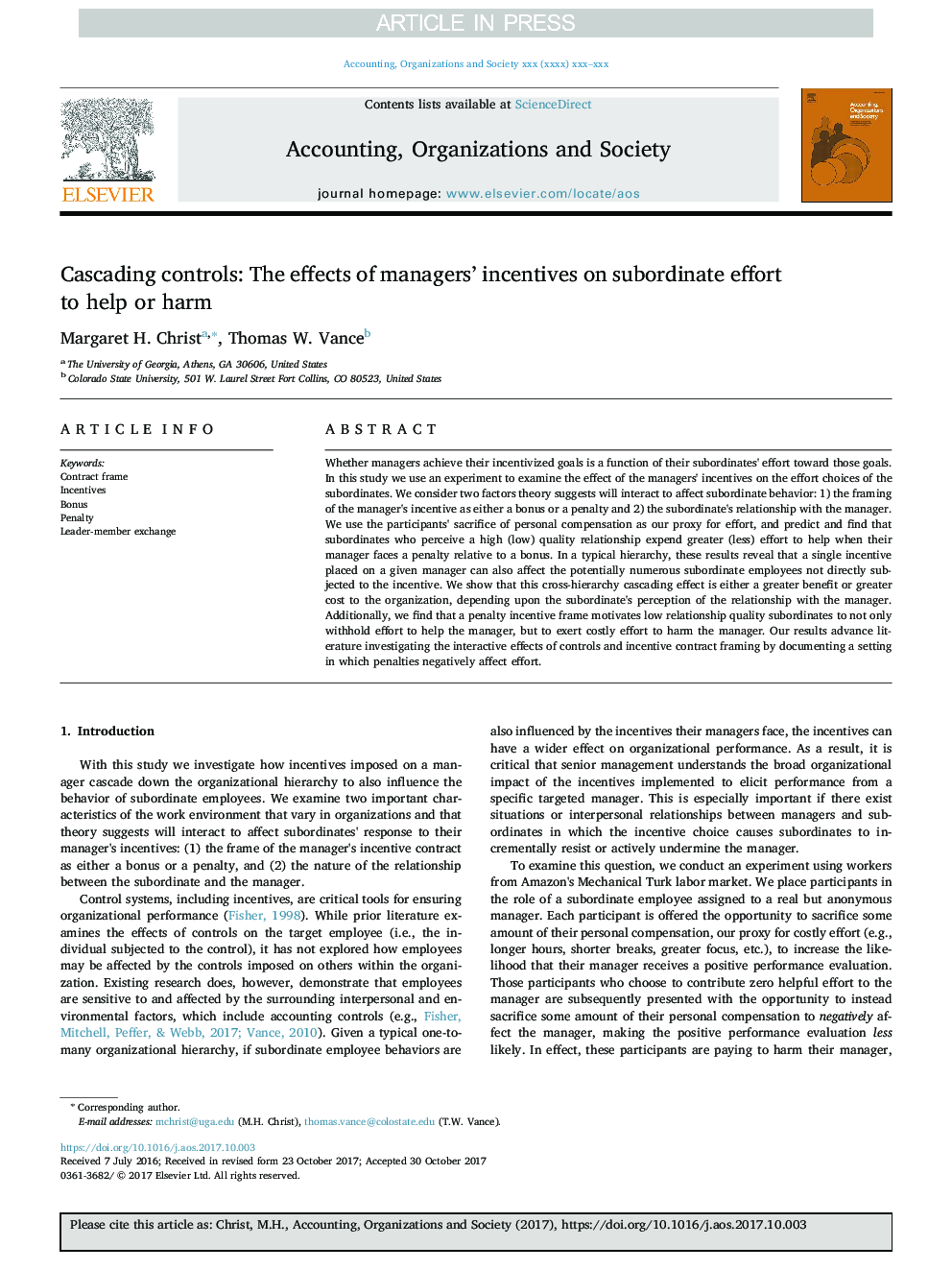| کد مقاله | کد نشریه | سال انتشار | مقاله انگلیسی | نسخه تمام متن |
|---|---|---|---|---|
| 7239483 | 1471233 | 2018 | 13 صفحه PDF | دانلود رایگان |
عنوان انگلیسی مقاله ISI
Cascading controls: The effects of managers' incentives on subordinate effort to help or harm
ترجمه فارسی عنوان
کنترل های آبشاری: اثرات انگیزه های مدیران بر تلاش های زیرزمینی برای کمک و یا آسیب رساندن
دانلود مقاله + سفارش ترجمه
دانلود مقاله ISI انگلیسی
رایگان برای ایرانیان
کلمات کلیدی
قاب قرارداد، انگیزه، جایزه، مجازات، تبادل رهبر عضو،
ترجمه چکیده
این که مدیران به اهداف انگیزشی خود دست یابند، عملکرد تابع زیردستانشان نسبت به آن اهداف است. در این مطالعه از یک آزمایش برای بررسی تأثیر انگیزه های مدیران بر گزینه های تلاش زیردستان استفاده می کنیم. ما فرض می کنیم که دو عامل وجود دارد که تابع تعاملات را تحت تاثیر قرار می دهد: 1) ایجاد انگیزه مدیر به عنوان یک پاداش یا مجازات و 2) رابطه تابع با مدیر. ما از قربانی کردن جبران خسارت شخصی به عنوان پروکسی برای تلاش هایمان استفاده می کنیم و پیش بینی و پیدا کردن آن دسته از وابسته هایی که روابط کیفیت بالا (کم) را درک می کنند تلاش بیشتری برای کمک به زمانی که مدیر خود با مجازات نسبت به یک پاداش مواجه می شود. در یک سلسله مراتب معمول، این نتایج نشان می دهد که یک انگیزه تنها بر روی یک مدیر مشخص قرار می گیرد همچنین می تواند کارکنان زیرمجموعه ای را که مستقیما تحت تاثیر انگیزه قرار نگرفته تحت تأثیر قرار دهند. ما نشان می دهیم که این تاثیر کاسکوردی یک سلسله مراتب، سودمندتر یا هزینه بیشتری برای سازمان می باشد، بسته به درک مدیران ارتباط با مدیر. علاوه بر این، متوجه می شویم که یک چارچوب انگیزه ی انگیزه، زیرساخت های کم کیفیت ارتباطی را به وجود می آورد که نه تنها تلاش خود را برای کمک به مدیر، بلکه تلاش های پرهزینه برای آسیب رساندن به مدیر، به همراه می آورد. نتایج ما پیش نویس ادوات بررسی اثرات تعاملی کنترل و قرارداد مشوق مشروط را با مستند سازی یک محیط که مجازات آن منفی بر تلاش است تاثیر می گذارد.
موضوعات مرتبط
علوم انسانی و اجتماعی
مدیریت، کسب و کار و حسابداری
حسابداری
چکیده انگلیسی
Whether managers achieve their incentivized goals is a function of their subordinates' effort toward those goals. In this study we use an experiment to examine the effect of the managers' incentives on the effort choices of the subordinates. We consider two factors theory suggests will interact to affect subordinate behavior: 1) the framing of the manager's incentive as either a bonus or a penalty and 2) the subordinate's relationship with the manager. We use the participants' sacrifice of personal compensation as our proxy for effort, and predict and find that subordinates who perceive a high (low) quality relationship expend greater (less) effort to help when their manager faces a penalty relative to a bonus. In a typical hierarchy, these results reveal that a single incentive placed on a given manager can also affect the potentially numerous subordinate employees not directly subjected to the incentive. We show that this cross-hierarchy cascading effect is either a greater benefit or greater cost to the organization, depending upon the subordinate's perception of the relationship with the manager. Additionally, we find that a penalty incentive frame motivates low relationship quality subordinates to not only withhold effort to help the manager, but to exert costly effort to harm the manager. Our results advance literature investigating the interactive effects of controls and incentive contract framing by documenting a setting in which penalties negatively affect effort.
ناشر
Database: Elsevier - ScienceDirect (ساینس دایرکت)
Journal: Accounting, Organizations and Society - Volume 65, February 2018, Pages 20-32
Journal: Accounting, Organizations and Society - Volume 65, February 2018, Pages 20-32
نویسندگان
Margaret H. Christ, Thomas W. Vance,
